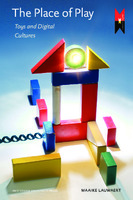The Place of Play
Toys and Digital Cultures
Abstract
Increasingly, technology is at stake in toys, games and playing. With the immense popularity of computer games, questions concerning the role and function of technology in play have become more pressing. A key aspect of the increasing technologization and digitalization of both toys and play is the vagueness of borders between producers, consumers and players. In these so-called participatory cultures, players do not simply play with toys designed behind closed doors but become co-designers. This book takes a critical look at the advantages and disadvantages of participatory cultures and places the changing world of toys, games and playing in a historical context. Contrary to many New Media and computer game studies, this book takes the historical background of these phenomena into account by situating the changing world of play in the context of the social and cultural processes of commodification, domestication and urbanization from the 1850s to the present. Technologie speelt een steeds belangrijkere rol in speelgoed en spellen. De immense populariteit van computerspellen maakt vragen over de invloed en functie van technologie steeds dwingender. Een van de kernaspecten van de toenemende 'technologisering' en 'digitalisering' van speelgoed en spellen is het vervagen van de grenzen tussen producenten, consumenten en spelers. In 'participatieve culturen' speelt men niet meer met achter gesloten deuren ontworpen spellen, maar worden de spelers zelf medeontwerpers. The Place of Play onderzoekt de aard, karakteristieken, mechanismen en problemen van deze participatieve culturen aan de hand van speelgoed en computerspellen.
Keywords
toys; wetenschap algemeen; computer games; cultuur and geschiedenis; participatory cultures; culture and history; motion pictures; film; popular science; many-to-many culturesDOI
10.5117/9789089640802ISBN
9789089640802OCN
432993967Publisher
Amsterdam University PressPublisher website
https://www.aup.nl/Publication date and place
2009Series
MediaMatters, 3Classification
Films, cinema
Television
History
Media studies
Science: general issues


 Download
Download